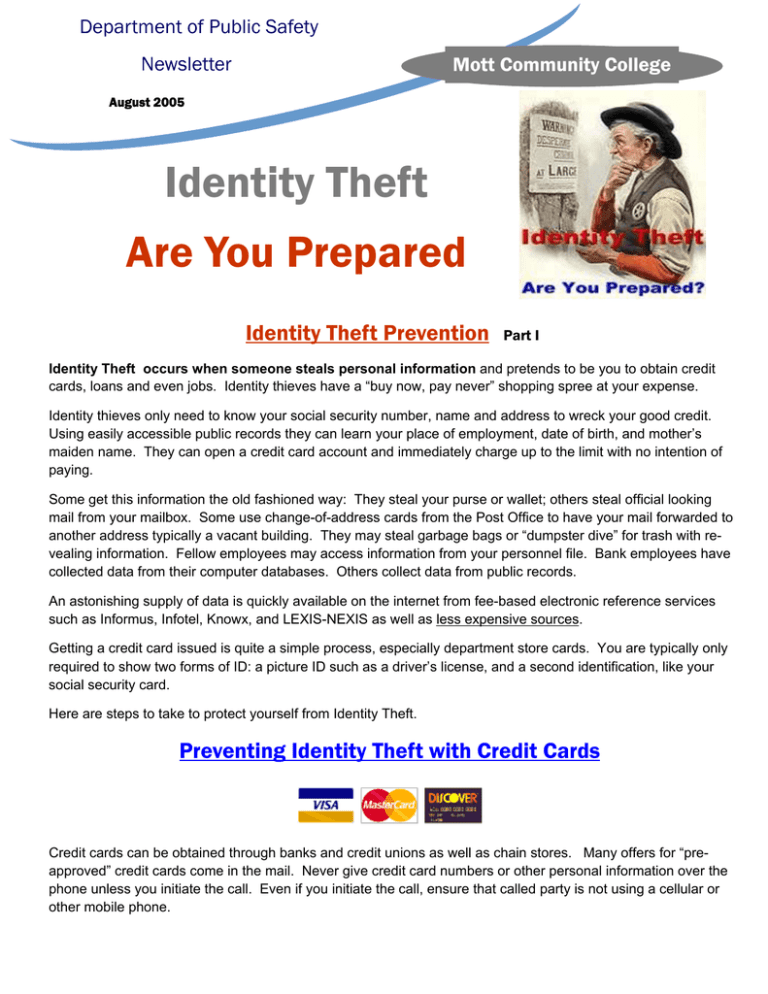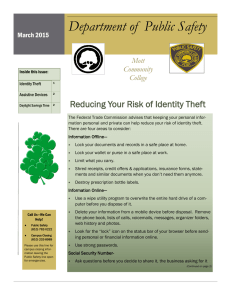Identity Theft Are You Prepared Identity Theft Prevention Department of Public Safety
advertisement

Department of Public Safety Newsletter Mott Community College August 2005 Identity Theft Are You Prepared Identity Theft Prevention Part I Identity Theft occurs when someone steals personal information and pretends to be you to obtain credit cards, loans and even jobs. Identity thieves have a “buy now, pay never” shopping spree at your expense. Identity thieves only need to know your social security number, name and address to wreck your good credit. Using easily accessible public records they can learn your place of employment, date of birth, and mother’s maiden name. They can open a credit card account and immediately charge up to the limit with no intention of paying. Some get this information the old fashioned way: They steal your purse or wallet; others steal official looking mail from your mailbox. Some use change-of-address cards from the Post Office to have your mail forwarded to another address typically a vacant building. They may steal garbage bags or “dumpster dive” for trash with revealing information. Fellow employees may access information from your personnel file. Bank employees have collected data from their computer databases. Others collect data from public records. An astonishing supply of data is quickly available on the internet from fee-based electronic reference services such as Informus, Infotel, Knowx, and LEXIS-NEXIS as well as less expensive sources. Getting a credit card issued is quite a simple process, especially department store cards. You are typically only required to show two forms of ID: a picture ID such as a driver’s license, and a second identification, like your social security card. Here are steps to take to protect yourself from Identity Theft. Preventing Identity Theft with Credit Cards Credit cards can be obtained through banks and credit unions as well as chain stores. Many offers for “preapproved” credit cards come in the mail. Never give credit card numbers or other personal information over the phone unless you initiate the call. Even if you initiate the call, ensure that called party is not using a cellular or other mobile phone. Identity Theft: Protect Your Social Security Number Your social security number is the main key to your credit safety. Anyone with your social security number can easily create a credit nightmare that will take years to resolve. What steps should you take to protect your social security number? ∗ Never carry documents containing your social security number; this includes your Social Security Card as well as many insurance cards. ∗ Never give your social security number to anyone by telephone, even if you make the call. ∗ Avoid having your social security number used for IDs at work. Request a different number if possible. ∗ Avoid using your social security number as your drivers license number. ∗ Do not pre-print or write your social security number on your checks. ∗ Ensure that those requesting your social security number are doing so for legitimate reasons, not merely bureaucratic reasons. ∗ Request a copy of your Social Security Personal Earnings and Benefit Estimate Statement at least every three years to make certain the information in the file is correct. Contact the Social Security Administration at (800)772-1213 to learn how to order this free report. Identity Theft Summary Always be wary of giving out any of the following information that can be used to establish your identity: ∗ ∗ ∗ ∗ ∗ ∗ ∗ ∗ ∗ Social Security Number Current and Previous Address Financial Institution or Investment Account Numbers Credit Card Numbers Date of Birth Driver’s License Number Mother’s Maiden Name (Frequently Used to Retrieve Forgotten Passwords) Passwords, Such as ATM Pin Numbers Phone Numbers, Both Daytime and Home Information Source: Identity theft-help.us ******************************************** This newsletter is provided to you by Mott Community College, Department of Public Safety, under the direction of Chief Clydell Duncan. “The Department of Public Safety is committed to a safe campus environment and to providing effective and efficient 24-hour emergency services. CAMPUS EMERGENCY: Dial 762-5666 or from any campus pay phone DIAL #1. NON-EMERGENCY: Dial 762-0222 or from any campus pay phone DIAL #9. Page 2 Editor: Lt. Colin Perry Secretary: Officer Beverly Davis Department of Public Safety

